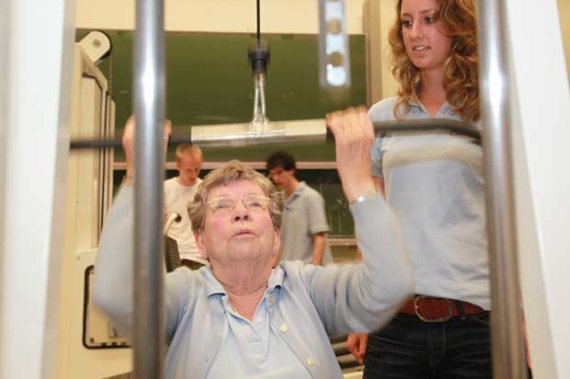Fragile older people – those who tire easily and are not very strong or mobile – benefit from weight training. And if they also get extra protein, their muscle mass increases more than when they continue with their usual diets. These discoveries were made by researchers at the Food and Nutrition Top Institute, the Human Nutrition department at Wageningen UR and Maastricht University Medical Centre. The research will be published in October’s issue of the Journal of the American Medical Directors Association. If our exercise patterns remain the same, we gradually lose muscle mass from the age of 30. After 65 the process speeds up and someone of 80 has on average half the muscle mass of someone of 30. ‘That is one of the main reasons why many elderly people start to function badly’, says Michael Tieland, a doctoral researcher at Human Nutrition and first author of the article. ‘This makes it important to maintain muscle mass. And to do that you need weight training.’ More muscle mass Tieland and his colleagues wondered whether you could increase the effectiveness of weight training by getting people to eat more protein. They studied 62 fragile elderly people of an average of 80 years old. The picked them up in minibuses twice a week for a fitness session at the university. The old people did whole-body workouts for 24 weeks on apparatus such as a leg press. Half of them also ate a protein supplement of 15 grams of protein twice a day; the other half were given a placebo. Tieland: ‘We used high quality proteins from dairy products: a combination of casein and whey proteins.’ The old people raved about the regime, says the researcher. Both groups had 40 percent more muscle power at the end of the experiment and they performed comparably better on a balance test, a walking test and a test in which they had to get up out of a chair. But the ‘protein group’ turned out to have developed almost one and a half kilos more muscle mass than the ‘placebo group’. ‘It is difficult to measure the direct health effect of this’, explains Tieland, ‘and we only expect those to emerge in the longer term. It is very likely, in any case, that more muscle mass leads to better health.’ If it is up to Tieland, all nursing homes will set up a fitness room as soon as they can. And should they give their residents special protein supplements as well? ‘It’s possible’, says Tieland, ‘but an extra portion of protein-rich products such as dairy, meat, soya or fish probably works just as well. I advise my own grandma to eat a bowl of quark at breakfast.’ /Nienke Beintema
Exercise is more effective with right diet
Muscle training for elderly is more effective in combination with extra protein. Positive impact on health is ‘considerable’.

